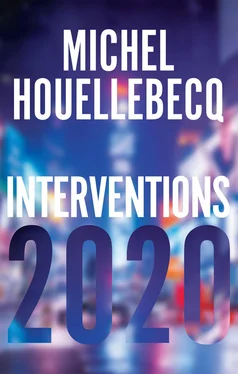As early as 1927, Niels Bohr was led to propose what has been called ‘the Copenhagen interpretation’. The product of a laborious and sometimes tragic compromise, the Copenhagen interpretation emphasizes the instruments and protocols of measurement. Giving full meaning to Heisenberg’s uncertainty principle, it establishes the act of knowledge on new bases: if it’s impossible to simultaneously measure all the parameters of a physical system with precision, this is not simply because they are ‘disturbed by the measurement’; more profoundly, they don’t exist outside of it. It makes no sense to talk about their previous state. The Copenhagen interpretation frees the scientific act by setting the couple of observer and observed in the place of a hypothetical real world; it allows science to be overhauled in all its generality as a means of communication between human beings about ‘what we have observed, what we have learned’ – to use Bohr’s words.
Overall, the physicists of the present century have stuck with the Copenhagen interpretation; which is not a very comfortable position. Of course, in the daily practice of research, the best way to progress is to stick to a hard positivist approach, which can be summed up as follows: ‘We are content to bring together observations, human observations, and to correlate them by laws. The idea of reality isn’t scientific, it doesn’t interest us.’ But it must still be unpleasant, sometimes, to realize that the theory you’re producing absolutely cannot be formulated in plain language.
It’s at this point that we start to glimpse strange parallels. For a long time I have been struck by the way that, whenever people put questions to the theorists of physics, the latter – once they have left behind spectral decompositions, Hilbert spaces, Hermitian operators, etc., namely the usual fare of their publications – pay a powerful tribute to poetic language. Not to detective novels, nor to serial music: no, what interests and troubles them is, quite specifically, poetry. Before reading Jean Cohen, I had no idea why; upon discovering his poetics, I realized that something was definitely happening, and that this something was not unrelated to Niels Bohr’s proposals.
In the mood of conceptual catastrophe produced by early quantum discoveries, it was sometimes suggested that it would be appropriate to create a new language, a new logic, or both. Clearly, ancient language and logic did not lend themselves to the representation of the quantum universe. Still, Bohr was reluctant. Poetry, he pointed out, proves that the subtle and partly contradictory use of everyday language allows its limitations to be overcome. The principle of complementarity introduced by Bohr is a kind of fine-tuned management of contradiction: complementary points of view on the world are simultaneously introduced; each of them, taken in isolation, can be expressed unambiguously in plain language; each of them, taken in isolation, is false. Their joint presence creates a new situation, one that is uncomfortable for reason; but it’s only through this conceptual malaise that we can access a correct representation of the world. At the same time, Jean Cohen argues that poetry’s absurd use of language is not its own goal. Poetry breaks the causal chain and constantly plays with the explosive power of the absurd; but it’s not absurdity. It is absurdity made creative; creator of a different meaning, strange but immediate, limitless, emotional.
1 1. Jean Cohen (1919–1994), a theorist of poetry, was the author of two works in this field: La Structure du langage poétique [The Structure of Poetic Language] (Paris: Flammarion/Champs, 1966) and Le Haut Langage [Lofty Language] (Paris: Flammarion, 1979). The second was reprinted shortly after the author’s death (Paris: José Corti, 1995).
2 2. In his Manifeste du surréalisme, André Breton claimed that Paul Valéry, the poet, had told him that he (Valéry) would never condescend to writing such a banal sentence as ‘The marquise went out at five o’clock’ – the kind of sentence that realist novelists (as opposed to symbolist or surrealist poets) are obliged to write.
3 3. That is, a literary style associated with the kind of texts frequently published by Les Éditions de Minuit: often experimental, with a tendency to minimalism.
The purpose of the party is to make us forget that we are lonely, miserable and doomed to death; in other words, to transform us into animals. This is why primitive human beings have a very highly developed sense of the party. A nice dose of hallucinogenic plants, three tambourines, and they’re off: it doesn’t take much to keep them amused. In contrast, Westerners generally only end up in an inadequate state of ecstasy after endless raves from which they emerge deaf and drugged: they have no sense of the party at all. Profoundly self-conscious, radically alien to others, terrorized by the idea of death, they’re quite incapable of achieving any exaltation. However, they persist. The loss of their animal condition saddens them, they’re ashamed and resentful; they’d like to be party animals, or at least pass for such. They’re in a really lousy situation.
What the hell am I doing with these jerks?
‘For where two or three are gathered together in my name, there am I in the midst of them’ (Matthew 18: 20). But that’s the whole point: gathered together in the name of what? What could possibly justify gathering together?
Gathering together to have fun
This is the worst possible scenario. In such circumstances (nightclubs, dance sessions, parties), which are obviously no fun at all, there’s only one solution: flirting. Thereupon, we leave the register of the party to enter that of a fierce narcissistic competition, with or without the option of penetration. (It’s traditionally considered that a man needs penetration to obtain the desired narcissistic gratification; he then feels something analogous to the click of the ‘free game’ on old pinball machines. The woman, most often, is satisfied with the certainty that someone wants to penetrate her.) If these kinds of games disgust you, or you just don’t feel able to put a good face on them, there’s only one solution: make your getaway.
Gathering together to fight (student demonstrations, environmental gatherings, talk shows in the suburbs)
The idea, in principle, is ingenious: indeed, the benevolent glue of a common cause can entail a group effect, a feeling of belonging, even an authentic collective intoxication. Unfortunately, crowd psychology follows invariable laws: the stupidest and most aggressive elements always end up dominating the proceedings. So we find ourselves in the middle of a bunch of loud, even dangerous loudmouths. The choice is thus the same as in a nightclub: leave before things start kicking off, or else flirt (in a more favourable context in this case: the presence of common convictions, the feelings provoked by the progress of the protest may have slightly cracked the carapace of narcissism).
Gathering together to fuck (sex clubs, private orgies, some New Age groups)
One of the simplest and oldest formulas: unite humanity in what, after all, it most has in common. Sexual acts do take place, although there’s not always the expected pleasure. There’s that much to be said for it – not much else.
Gathering together to celebrate (masses, pilgrimages)
Religion proposes something very original: it boldly denies separation and death by asserting that, contrary to appearances, we are bathed in divine love while heading towards a blissful eternity. A religious ceremony in which the participants are imbued with faith would thus seem to be the sole example of a successful party . Some agnostic participants may even, for as long as the celebration lasts, feel overwhelmed by a sense of belief; but then they risk a terrible come-down (a bit like sex, but worse). One solution: to be touched by grace .
Читать дальше







